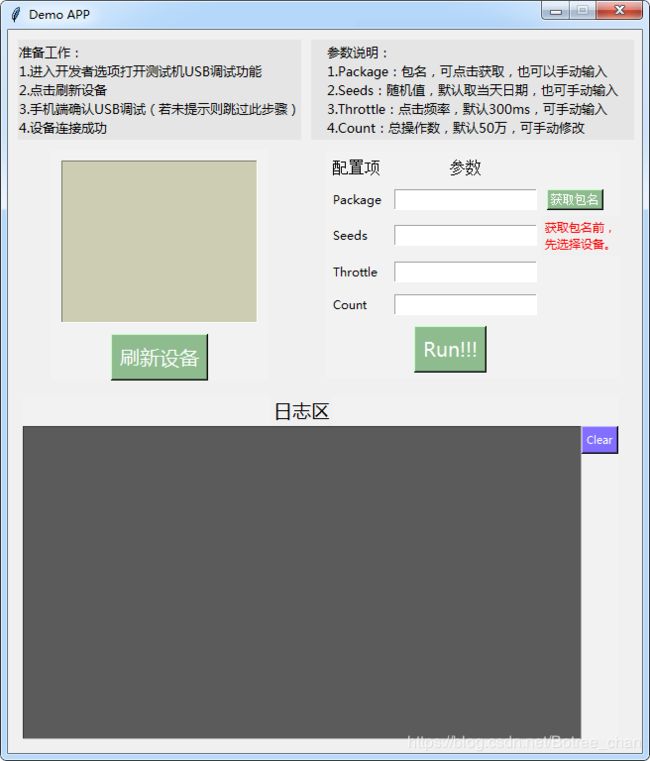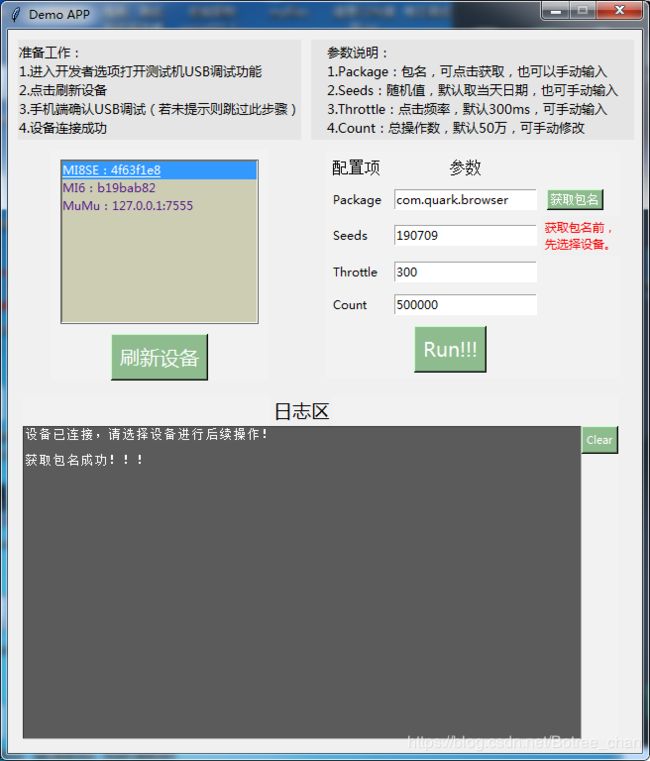多设备monkey测试工具_基于Tkinter GUI操作
V1.0版本
先看下效果吧:
简单的介绍下:
1.设备列表区域:用于展示当前连接的所有设备
2.monkey参数区域:用于显示即将执行的monkey参数
3.日志区域:用于显示必要日志(其实没啥卵用,就是看着高大上点)
操作流程:
1.刷新设备,获取当前连接的所有设备(必须)
2.填写monkey参数:
a).package:手动填写需要跑的APP包名;自动获取,需要现在左侧点击选择一台设备,打开设备上需要获取包名的应用,然后点击“获取包名”即可。
b).seed:随机值,默认取当前日期,这个纯属个人习惯
c).Throttle:操作间隔,大家都懂。。。
d).Count:总的操作次数,我默认的50万,感觉这个差不多吧。
3.点击“RUN”就好了,所有设备都会跑起来
4.没做离线功能,所以还是需要连着数据线的
结果查看:
同目录下会生成一个result文件夹,里面包括Crash日志、内存日志、monkeylog信息,直接取就好了
代码:
import glob
import json
import logging
import os
import re
import time
import tkinter as tk
import tkinter.messagebox
window = tk.Tk()
window.title("Demo APP")
width = 640
height = 730
# 设置窗口适应属性
window.resizable(width=False, height=False)
window.attributes("-alpha",0.7)
window.attributes('-toolwindow', False,
'-alpha', 1,
'-fullscreen', False,
'-topmost', True)
# window.overrideredirect(True)
# 获取当前屏幕分辨率
screenwidth = window.winfo_screenwidth()
screenheight = window.winfo_screenheight()
# 根据分辨率设置窗口大小
alignstr = '%dx%d+%d+%d' % (width, height, (screenwidth-width)/1, (screenheight-height)/5)
window.geometry(alignstr)
# ----frame-----
frame_main1 = tk.Frame(window, bg = "#F2F2F2", height=100, width=360)
frame_main1.grid(column=1,row=1,padx=10,pady=10)
frame_main2 = tk.Frame(window, bg = "#F2F2F2", height=100, width=400)
frame_main2.grid(column=2,row=1)
frame_main3 = tk.Frame(window, bg = "#F2F2F2", height=200, width=370)
frame_main3.grid(column=1,row=2)
frame_main4 = tk.Frame(window, bg ="#F2F2F2", height=200, width=360)
frame_main4.grid(column=2,row=2)
frame_main5 = tk.Frame(window, bg = "#F2F2F2", height=300, width=720)
frame_main5.grid(column=1,row=3,columnspan=2,padx=15,pady=15)
# -----menu菜单功能,暂时不要后续添加--------
# meun_main = tk.Menu()
# # meun_main.grid()
# filemenu = tk.Menu(meun_main, tearoff=1)
# meun_main.add_cascade(label='File', menu=filemenu)
# filemenu.add_command(label='Monkey')
# filemenu.add_command(label='Screen')
# filemenu.add_command(label='Instructions')
# filemenu.add_command(label='About')
# window.config(menu = filemenu)
# -------Log缓存区域,显示自定义日志--------
lable_log=tk.Label(frame_main5,text="日志区",font = ("微软雅黑",14))
lable_log.grid(column=1,row=1)
text_log = tk.Text(frame_main5,bg="#5B5B5B",fg="#FFFFFF")
text_log.grid(column=1,row=2)
def clear_log():
text_log.delete("1.0","end")
button_clearLog = tk.Button(frame_main5,text="Clear",font = ("微软雅黑",8),bg="#836FFF", fg= "#FFFFFF",command=clear_log)
button_clearLog.grid(column=2,row=2,sticky="n")
# text_log.insert("end","adasd21dadd")
# ------主页lable显示引导---------------
# 刷新设备说明
lable_main1 = tk.Label(frame_main1, justify="left", height=5, width=35, bg="#E5E5E5", font = ("微软雅黑",10), text="准备工作:\n1.进入开发者选项打开测试机USB调试功能\n2.点击刷新设备\n3.手机端确认USB调试(若未提示则跳过此步骤)\n4.设备连接成功")
lable_main1.grid()
# monkey参数说明
lable_main2 = tk.Label(frame_main2, justify="left", height=5, width=40, bg="#E5E5E5", font = ("微软雅黑",10), text="参数说明:\n1.Package:包名,可点击获取,也可以手动输入\n2.Seeds:随机值,默认取当天日期,也可手动输入\n3.Throttle:点击频率,默认300ms,可手动输入\n4.Count:总操作数,默认50万,可手动修改")
lable_main2.grid()
# ----listbox用于显示当前设备列表-----
lb = tk.Listbox(frame_main3,height=9, width=28, bg="#CDCDB4", fg="#551A8B")
lb.grid(column=0,row=0,padx=10,pady=10)
# -----frame4上的参数配置-----
lab1 = tk.Label(frame_main4,text="配置项",bg="#F2F2F2",font=(11))
lab2 = tk.Label(frame_main4,text="Package",bg="#F2F2F2" )
lab3 = tk.Label(frame_main4,text="Seeds",bg="#F2F2F2" )
lab4 = tk.Label(frame_main4,text="Throttle",bg="#F2F2F2" )
lab5 = tk.Label(frame_main4,text="Count",bg="#F2F2F2" )
lab6 = tk.Label(frame_main4,text="参数",bg="#F2F2F2",font=(11) ) #第二列标题哦
lab1.grid(column=1,row=1,padx=5,pady=5)
lab2.grid(column=1,row=2,padx=5,pady=5,sticky="w")
lab3.grid(column=1,row=3,padx=5,pady=5,sticky="w")
lab4.grid(column=1,row=4,padx=5,pady=5,sticky="w")
lab5.grid(column=1,row=5,padx=5,pady=5,sticky="w")
lab6.grid(column=2,row=1,padx=1,pady=1)
# -----entry monkey参数配置-------
entry1 = tk.Entry(frame_main4)
entry2 = tk.Entry(frame_main4)
entry3 = tk.Entry(frame_main4)
entry4 = tk.Entry(frame_main4)
entry1.grid(column=2,row=2,padx=5,pady=1,sticky="w")
entry2.grid(column=2,row=3,padx=5,pady=1,sticky="w")
entry3.grid(column=2,row=4,padx=5,pady=1,sticky="w")
entry4.grid(column=2,row=5,padx=5,pady=1,sticky="w")
# ------一些可能用到的全局变量------
select_var = ""
pkg_details = ""
button_state = ""
model_name = ""
# 创建一个空list存储设备
list_device = []
# monkey配置参数
p = ""
s = ""
t = ""
c = ""
def find_and_init():
# def find_devices():
global list_device,model_name
list_device.clear()
logging.basicConfig(level=logging.INFO)
d_lists = os.popen("adb devices").readlines()
logging.error(d_lists)
d_lists.remove(d_lists[len(d_lists)-1])
d_lists.remove(d_lists[0])
lb.delete("0","end")
logging.info(d_lists)
# time.sleep(3)
if len(d_lists)==0:
lb.insert("end","未检测到设备,请连接测试机...")
text_log.insert("end","未检测到设备,请连接测试机...\n")
text_log.yview_moveto(1)
text_log.update()
elif "unauthorized" in d_lists[0]:
lb.insert("end","请在手机上点击允许USB调试...")
text_log.insert("end","请在手机上点击允许USB调试...\n")
text_log.yview_moveto(1)
text_log.update()
else:
text_log.insert("end","设备已连接,请选择设备进行后续操作!\n\n")
text_log.yview_moveto(1)
text_log.update()
for i in d_lists:
reg_serial = re.findall("(.*?)device", i)
model_org = os.popen("adb -s "+str(reg_serial[0])+" shell getprop ro.product.model").readlines()
logging.info(reg_serial[0].replace("\t","")+":"+model_org[0].replace("\n",""))
# 将设备信息添加到listbox中
per_list = reg_serial[0].replace("\t","")
print("设备列表为:",per_list)
os.system("adb -s "+str(per_list)+" logcat -c")
lb.insert("end",model_org[0].replace("\n","").replace(" ","")+":"+per_list)
model_name = model_org[0].replace("\n","").replace(" ","")
list_device.append(per_list)
# ------读写配置文件-----------
# def init_config():
entry1.delete(0,"end")
entry2.delete(0,"end")
entry3.delete(0,"end")
entry4.delete(0,"end")
# time.sleep(3)
if os.path.exists("config.json"):
with open('config.json',encoding="utf-8") as ff:
json_data = json.load(ff)
entry1.insert("end",json_data["pkg"])
entry2.insert("end", time.strftime("%Y%m%d%H%M%S", time.localtime())[2:8])
entry3.insert("end", json_data["thr"])
entry4.insert("end", json_data["total"])
else:
config_file = open('config.json','w',encoding='utf-8')
# json_data = {"pkg":"请在此处填写包名...","sd":time.strftime("%Y%m%d%H%M%S", time.localtime())[2:8],"thr":"300","total":"500000"}
json_data = {"pkg":"请在此处填写包名...", "thr":"300","total":"500000"}
json.dump(json_data,config_file,ensure_ascii=False)
config_file.close()
# p=entry1.get()
# s=entry2.get()
# t=entry3.get()
# c=entry4.get()
# -----------按钮事件--------
# 刷新设备按钮
button = tk.Button(frame_main3,text="刷新设备",font = ("微软雅黑",15),bg="#8FBC8F", fg= "#FFFFFF", command=find_and_init)
button.grid(column=0,row=1)
# --------获取当前包名---------
def get_pkg():
global select_var
global pkg_details
logging.info(select_var)
# global select_var
selected=lb.get(lb.curselection())
print("我也不知道这里会不会报错 ",selected)
print("原始的",selected,type(selected))
reg_device=".*?:(.*)"
select_device = re.findall(reg_device, selected)
print("选择的设备是",select_device[0])
select_var=select_device[0]
try:
cur = os.popen("adb -s "+str(select_var)+" shell dumpsys window | findstr mCurrentFocus").readline()
result=re.findall("mCurrentFocus=Window{.*?u0 (.*?)/.*?}", cur)
pkg_details = result[0]
logging.info(cur)
except IndexError:
entry1.delete(0,"end")
entry1.insert("end","获取失败...")
tk.messagebox.showerror("Error了吧,哈哈哈!","请注意:\n 1.确认设备已经连接。\n 2.需要获取包名的应用处于前台状态!")
entry1.delete(0,"end")
entry1.insert("end","点击重试...")
except TypeError:
entry1.delete(0,"end")
entry1.insert("end","未选择设备哦!")
tk.messagebox.showerror("Error,这个不是Bug...","没有选择设备哦!")
entry1.delete(0,"end")
entry1.insert("end","点击重试...")
else:
entry1.delete(0,"end")
entry1.insert("end",pkg_details)
text_log.insert("end","获取包名成功!!!\n\n")
text_log.yview_moveto(1)
text_log.update()
def run_monkey():
now_time = time.strftime("%Y%m%d%H%M%S", time.localtime())[4:12]
if not os.path.exists("./Result/"+str(now_time)):
text_log.insert("end","创建必要资源文件夹....\n\n")
text_log.yview_moveto(1)
text_log.update()
os.makedirs("./Result/"+str(now_time))
if not os.path.exists("./script/"+str(now_time)):
text_log.insert("end","创建必要资源文件夹....\n\n")
text_log.yview_moveto(1)
text_log.update()
os.makedirs("./script/"+str(now_time))
global p,s,t,c
p=entry1.get()
s=entry2.get()
t=entry3.get()
c=entry4.get()
global button_state
button_state = "disabled"
print(pkg_details)
text_log.insert("end","即将开始初始化资源,请稍等...\n")
if len(list_device)>0:
if entry1.get() in (u"请在此处填写包名...",""):
tk.messagebox.showerror("你又错了!!!","不出意外的话你包名肯定不对!!")
else:
for d in list_device:
bat_monkey = str(d[:8])+"_monkey_"+str(pkg_details)+".bat"
with open ("script\\"+str(now_time)+"\\"+bat_monkey, "w") as f:
text_log.insert("end","生成"+str(d)+"---monkey脚本...\n")
text_log.yview_moveto(1)
text_log.update()
f.write('@echo off\necho start monkey test\ntitle Monkey\nadb -s '+str(d)+' shell monkey -s '+str(s)+' -p '+str(p)+' --throttle '+str(t)+' --ignore-crashes --ignore-native-crashes --ignore-security-exceptions --ignore-timeouts --monitor-native-crashes -v -v -v '+str(c)+' > ./Result/'+str(now_time)+'/'+str(d[:8])+'_monkey.log')
bat_fc = str(d[:8])+"_fc_"+str(pkg_details)+".bat"
with open ("script\\"+str(now_time)+"\\"+bat_fc, "w") as ff:
text_log.insert("end","生成"+str(d)+"---crash监控脚本...\n")
text_log.yview_moveto(1)
text_log.update()
ff.write('@echo off\necho Start collecting crash logs\ntitle Crash\nadb -s '+str(d)+' logcat -s AndroidRuntime > ./Result/'+str(now_time)+'/'+str(d[:8])+'_crash.log')
bat_memory = str(d[:8])+"_memory_"+str(pkg_details)+".bat"
with open ("script\\"+str(now_time)+"\\"+bat_memory, "w") as fff:
text_log.insert("end","生成"+str(d)+"---内存监控脚本...\n\n")
text_log.yview_moveto(1)
text_log.update()
fff.write('@echo off\necho Start collecting memory logs\ntitle Memory\n:memory\nadb -s '+str(d)+' shell dumpsys meminfo '+str(p)+' | findstr TOTAL: > ./Result/'+str(now_time)+'/'+str(d[:8])+'_memory.log\nping -n 30 127.0.0.1>nul\ngoto memory')
bat_finally = glob.glob("script\\"+str(now_time)+"\\*.bat")
print("最终的bat有",bat_finally)
time.sleep(2)
text_log.insert("end","一切准备就绪,即将启动所有骚操作!!!\n\n")
text_log.yview_moveto(1)
text_log.update()
text_log.insert("end","\n包名:"+p)
text_log.insert("end","\nseeds值:"+s)
text_log.insert("end","\nthrottle值:"+t)
text_log.insert("end","\n总测试数:"+c)
for gogo in bat_finally:
os.system("start "+gogo)
time.sleep(1)
else:
# len(list_device)==0:
tk.messagebox.showerror("你又错了!!!","请注意:\n 1.确认设备已经连接。\n 2.确认包名不为空!!")
# 获取包名按钮
button_getpkg = tk.Button(frame_main4,text="获取包名", fg= "#FFFFFF",font = ("",9),bg="#8FBC8F",command=get_pkg)
button_getpkg.grid(column=3,row=2,padx=5,pady=5,sticky="w")
notice_lable = tk.Label(frame_main4,text="获取包名前,\n先选择设备。", justify="left",fg="red")
notice_lable.grid(column=3,row=3)
button_make_res = tk.Button()
# Monkey启动按钮
if button_state == "disabled":
button_runmonkey = tk.Button(frame_main4,text="Run!!!",state="disabled", fg= "#FFFFFF",font = ("微软雅黑",15),bg="#8FBC8F",command=run_monkey)
button_runmonkey.grid(column=2,row=7,padx=25,pady=5,sticky="w")
else:
button_runmonkey = tk.Button(frame_main4,text="Run!!!", fg= "#FFFFFF",font = ("微软雅黑",15),bg="#8FBC8F",command=run_monkey)
button_runmonkey.grid(column=2,row=7,padx=25,pady=5,sticky="w")
button_state = "disabled"
window.mainloop()
V2.0版本
更新日志:
1.新增支持离线脱机测试,monkey开启后等待5s左右拔掉数据线即可
2.新增支持一键导出测试结果
3.暂不支持多设备同时执行了
import glob
import json
import logging
import os
import re
import time
import tkinter as tk
import tkinter.messagebox
from tkinter.filedialog import askdirectory
import _thread
window = tk.Tk()
window.title("便捷monkey测试工具")
width = 670
height = 730
# 设置窗口适应属性
window.resizable(width=False, height=False)
window.attributes("-alpha",0.7)
window.attributes('-toolwindow', False,
'-alpha', 1,
'-fullscreen', False,
'-topmost', True)
# window.overrideredirect(True)
# 获取当前屏幕分辨率
screenwidth = window.winfo_screenwidth()
screenheight = window.winfo_screenheight()
# 根据分辨率设置窗口大小
alignstr = '%dx%d+%d+%d' % (width, height, (screenwidth-width)/1, (screenheight-height)/5)
window.geometry(alignstr)
# ----frame-----
frame_main1 = tk.Frame(window, bg = "#F2F2F2", height=100, width=360)
frame_main1.grid(column=1,row=1,padx=10,pady=10)
frame_main2 = tk.Frame(window, bg = "#F2F2F2", height=100, width=400)
frame_main2.grid(column=2,row=1)
frame_main3 = tk.Frame(window, bg = "#F2F2F2", height=200, width=370)
frame_main3.grid(column=1,row=2)
frame_main4 = tk.Frame(window, bg ="#F2F2F2", height=200, width=360)
frame_main4.grid(column=2,row=2)
frame_main5 = tk.Frame(window, bg = "#F2F2F2", height=300, width=720)
frame_main5.grid(column=1,row=3,columnspan=2,padx=15,pady=15)
# 选择路径的frame
# frame_main6 = tk.Frame(window, bg = "#F2F2F2", height=300, width=720)
# frame_main6.grid(column=1,row=4,columnspan=2,padx=15,pady=15)
# -----menu菜单功能,暂时不要后续添加--------
# meun_main = tk.Menu()
# # meun_main.grid()
# filemenu = tk.Menu(meun_main, tearoff=1)
# meun_main.add_cascade(label='File', menu=filemenu)
# filemenu.add_command(label='Monkey')
# filemenu.add_command(label='Screen')
# filemenu.add_command(label='Instructions')
# filemenu.add_command(label='About')
# window.config(menu = filemenu)
# -------Log缓存区域,显示自定义日志--------
# lable_log=tk.Label(frame_main6,text="日志区",font = ("微软雅黑",14))
# lable_log.grid(column=1,row=1,sticky="W")
# 控制台输出显示的位置
text_log = tk.Text(frame_main5,bg="#5B5B5B",fg="#FFFFFF")
text_log.grid(column=1,columnspan=3,row=2)
# ----------导出日志模块------------
path = ""
local_location = ""
def selectPath():
global path, local_location
path = askdirectory()
print("选择的位置:"+path)
local.delete(0,"end")
local.insert("end",path)
local_location=path
text_log.insert("end","==========================注意==========================\n\n1、导出日志暂不支持多台设备同时操作,请连接一台设备操作\n\n2、相同路径导出会覆盖原结果,请手动备份或选择不同目录\n\n\n")
text_log.yview_moveto(2)
text_log.update()
local = tk.Entry(frame_main5, textvariable = path)
local.grid(row = 1, column = 2, sticky="W")
local.insert("end"," 点击选择导出路径......")
tk.Button(frame_main5, text = "选择路径:",bg="#AB82FF", command = selectPath).grid(row = 1, column = 1, sticky="E")
def pull_log():
print("本地位置:"+local_location)
os.system("adb pull sdcard/Auto/crash.log "+local_location)
os.system("adb pull sdcard/Auto/meminfo.log "+local_location)
os.system("adb pull sdcard/Auto/monkey.log "+local_location)
os.system("adb pull sdcard/Auto/meminfomini.log "+local_location)
text_log.insert("end","\n导出成功,请去目录下查看~~~~~\n")
text_log.yview_moveto(1)
text_log.update()
tk.Button(frame_main5, text = "导出结果",bg="#AB82FF", command = pull_log).grid(row = 1, column = 3, sticky="W")
def clear_log():
text_log.delete("1.0","end")
button_clearLog = tk.Button(frame_main5,text="Clear",font = ("微软雅黑",8),bg="#836FFF", fg= "#FFFFFF",command=clear_log)
button_clearLog.grid(column=4,row=2,sticky="n")
# text_log.insert("end","adasd21dadd")
# ------主页lable显示引导---------------
# 刷新设备说明
lable_main1 = tk.Label(frame_main1, justify="left", height=5, width=35, bg="#E5E5E5", font = ("微软雅黑",10), text="准备工作:\n1.进入开发者选项打开测试机USB调试功能\n2.点击刷新设备\n3.手机端确认USB调试(若未提示则跳过此步骤)\n4.设备连接成功")
lable_main1.grid()
# monkey参数说明
lable_main2 = tk.Label(frame_main2, justify="left", height=5, width=40, bg="#E5E5E5", font = ("微软雅黑",10), text="参数说明:\n1.Package:包名,可点击获取,也可以手动输入\n2.Seeds:随机值,默认取当天日期,也可手动输入\n3.Throttle:点击频率,默认300ms,可手动输入\n4.Count:总操作数,默认50万,可手动修改")
lable_main2.grid()
# ----listbox用于显示当前设备列表-----
lb = tk.Listbox(frame_main3,height=9, width=28, bg="#CDCDB4", fg="#551A8B")
lb.grid(column=0,row=0,padx=10,pady=10)
# -----frame4上的参数配置-----
lab1 = tk.Label(frame_main4,text="配置项",bg="#F2F2F2",font=(11))
lab2 = tk.Label(frame_main4,text="Package",bg="#F2F2F2" )
lab3 = tk.Label(frame_main4,text="Seeds",bg="#F2F2F2" )
lab4 = tk.Label(frame_main4,text="Throttle",bg="#F2F2F2" )
lab5 = tk.Label(frame_main4,text="Count",bg="#F2F2F2" )
lab6 = tk.Label(frame_main4,text="参数",bg="#F2F2F2",font=(11) ) #第二列标题哦
lab1.grid(column=1,row=1,padx=5,pady=5)
lab2.grid(column=1,row=2,padx=5,pady=5,sticky="w")
lab3.grid(column=1,row=3,padx=5,pady=5,sticky="w")
lab4.grid(column=1,row=4,padx=5,pady=5,sticky="w")
lab5.grid(column=1,row=5,padx=5,pady=5,sticky="w")
lab6.grid(column=2,row=1,padx=1,pady=1)
# -----entry monkey参数配置-------
entry1 = tk.Entry(frame_main4)
entry2 = tk.Entry(frame_main4)
entry3 = tk.Entry(frame_main4)
entry4 = tk.Entry(frame_main4)
entry1.grid(column=2,row=2,padx=5,pady=1,sticky="w")
entry2.grid(column=2,row=3,padx=5,pady=1,sticky="w")
entry3.grid(column=2,row=4,padx=5,pady=1,sticky="w")
entry4.grid(column=2,row=5,padx=5,pady=1,sticky="w")
# ------一些可能用到的全局变量------
select_var = ""
pkg_details = ""
button_state = ""
model_name = ""
# 创建一个空list存储设备
list_device = []
# monkey配置残水
p = ""
s = ""
t = ""
c = ""
def find_and_init():
# def find_devices():
global list_device,model_name
list_device.clear()
logging.basicConfig(level=logging.INFO)
d_lists = os.popen("adb devices").readlines()
logging.error(d_lists)
d_lists.remove(d_lists[len(d_lists)-1])
d_lists.remove(d_lists[0])
lb.delete("0","end")
logging.info(d_lists)
# time.sleep(3)
if len(d_lists)==0:
lb.insert("end","未检测到设备,请连接测试机...")
text_log.insert("end","未检测到设备,请连接测试机...\n")
text_log.yview_moveto(1)
text_log.update()
elif "unauthorized" in d_lists[0]:
lb.insert("end","请在手机上点击允许USB调试...")
text_log.insert("end","请在手机上点击允许USB调试...\n")
text_log.yview_moveto(1)
text_log.update()
else:
text_log.insert("end","设备已连接,请选择设备进行后续操作!\n\n")
text_log.yview_moveto(1)
text_log.update()
for i in d_lists:
reg_serial = re.findall("(.*?)device", i)
model_org = os.popen("adb -s "+str(reg_serial[0])+" shell getprop ro.product.model").readlines()
logging.info(reg_serial[0].replace("\t","")+":"+model_org[0].replace("\n",""))
# 将设备信息添加到listbox中
per_list = reg_serial[0].replace("\t","")
print("设备列表为:",per_list)
os.system("adb -s "+str(per_list)+" logcat -c")
lb.insert("end",model_org[0].replace("\n","").replace(" ","")+":"+per_list)
model_name = model_org[0].replace("\n","").replace(" ","")
list_device.append(per_list)
# ------读写配置文件-----------
# def init_config():
entry1.delete(0,"end")
entry2.delete(0,"end")
entry3.delete(0,"end")
entry4.delete(0,"end")
# time.sleep(3)
if os.path.exists("config.json"):
with open('config.json',encoding="utf-8") as ff:
json_data = json.load(ff)
entry1.insert("end",json_data["pkg"])
entry2.insert("end", time.strftime("%Y%m%d%H%M%S", time.localtime())[2:8])
entry3.insert("end", json_data["thr"])
entry4.insert("end", json_data["total"])
else:
config_file = open('config.json','w',encoding='utf-8')
# json_data = {"pkg":"请在此处填写包名...","sd":time.strftime("%Y%m%d%H%M%S", time.localtime())[2:8],"thr":"300","total":"500000"}
json_data = {"pkg":"请在此处填写包名...", "thr":"300","total":"500000"}
json.dump(json_data,config_file,ensure_ascii=False)
config_file.close()
# p=entry1.get()
# s=entry2.get()
# t=entry3.get()
# c=entry4.get()
# -----------按钮事件--------
# 刷新设备按钮
button = tk.Button(frame_main3,text="刷新设备",font = ("微软雅黑",15),bg="#8FBC8F", fg= "#FFFFFF", command=find_and_init)
button.grid(column=0,row=1)
# --------获取当前包名---------
def get_pkg():
global select_var
global pkg_details
logging.info(select_var)
# global select_var
selected=lb.get(lb.curselection())
print("我也不知道这里会不会报错 ",selected)
print("原始的",selected,type(selected))
reg_device=".*?:(.*)"
select_device = re.findall(reg_device, selected)
print("选择的设备是",select_device[0])
select_var=select_device[0]
try:
cur = os.popen("adb -s "+str(select_var)+" shell dumpsys window | findstr mCurrentFocus").readline()
result=re.findall("mCurrentFocus=Window{.*?u0 (.*?)/.*?}", cur)
pkg_details = result[0]
logging.info(cur)
except IndexError:
entry1.delete(0,"end")
entry1.insert("end","获取失败...")
tk.messagebox.showerror("Error了吧,哈哈哈!","请注意:\n 1.确认设备已经连接。\n 2.需要获取包名的应用处于前台状态!")
entry1.delete(0,"end")
entry1.insert("end","点击重试...")
except TypeError:
entry1.delete(0,"end")
entry1.insert("end","未选择设备哦!")
tk.messagebox.showerror("Error,这个不是Bug...","没有选择设备哦!")
entry1.delete(0,"end")
entry1.insert("end","点击重试...")
else:
entry1.delete(0,"end")
entry1.insert("end",pkg_details)
text_log.insert("end","获取包名成功,请在包名栏查看确认!!!\n\n")
text_log.yview_moveto(1)
text_log.update()
def run_monkey():
now_time = time.strftime("%Y%m%d%H%M%S", time.localtime())[4:12]
if not os.path.exists("./script/"+str(now_time)):
text_log.insert("end","创建必要资源文件夹....\n\n")
text_log.yview_moveto(1)
text_log.update()
os.makedirs("./script/"+str(now_time))
global p,s,t,c
p=entry1.get()
s=entry2.get()
t=entry3.get()
c=entry4.get()
global button_state
button_state = "disabled"
print(pkg_details)
text_log.insert("end","即将开始初始化资源,请稍等...\n")
if len(list_device)>0:
if entry1.get() in (u"请在此处填写包名...",""):
tk.messagebox.showerror("你又错了!!!","不出意外的话你包名肯定不对!!")
else:
sh_monkey = "_monkey_"+str(pkg_details)+".sh"
with open ("script\\"+str(now_time)+"\\"+sh_monkey, "w") as f:
text_log.insert("end","生成monkey脚本...\n")
text_log.yview_moveto(1)
text_log.update()
f.write('#!/system/bin/sh\na=`monkey -s '+str(s)+' -p '+str(p)+' --throttle '+str(t)+' --ignore-crashes --ignore-native-crashes --ignore-security-exceptions --ignore-timeouts --monitor-native-crashes -v -v -v '+str(c)+' > /sdcard/Auto/monkey.log`;b=`sh common.sh &`')
sh_fc = "_fc_"+str(pkg_details)+".sh"
with open ("script\\"+str(now_time)+"\\"+sh_fc, "w") as ff:
text_log.insert("end","生成crash监控脚本...\n")
text_log.yview_moveto(1)
text_log.update()
ff.write('#!/system/bin/sh\nlogcat -s AndroidRuntime>>crash.log')
sh_memory = "_memory_"+str(pkg_details)+".sh"
with open ("script\\"+str(now_time)+"\\"+sh_memory, "w") as fff:
text_log.insert("end","生成内存监控脚本...\n")
text_log.yview_moveto(1)
text_log.update()
fff.write('#!/system/bin/sh\nwhile true;do if [ -e "1" ];then echo `date`" -- monkey finished!!!">>meminfo.log;break;else dumpsys meminfo '+str(p)+'>>meminfo.log;sleep 30;continue;fi; done')
# sh_memorymini = "_memorymini_"+str(pkg_details)+".sh"
# with open ("script\\"+str(now_time)+"\\"+sh_memorymini, "w") as ffff:
# text_log.insert("end","生成内存监控脚本mini...\n\n")
# text_log.yview_moveto(1)
# text_log.update()
# ffff.write('#!/system/bin/sh\nwhile true;sleep 30; do if [ -e "1" ];then echo `date`" -- monkey finished!!!">>meminfo.log;break;else dumpsys meminfo '+str(p)+' | grep TOTAL:>>meminfomini.log;continue;fi; done')
#这里区分设备,后面从这里开始
for d in list_device:
os.system("adb -s "+str(d)+" shell rm -r sdcard/Auto/")
text_log.insert("end","初始化设备环境...\n")
text_log.yview_moveto(1)
text_log.update()
os.system('adb -s '+str(d)+' shell "cd sdcard && mkdir Auto')
text_log.insert("end","创建资源文件夹...\n")
text_log.yview_moveto(1)
text_log.update()
sh_finally = glob.glob("script\\"+str(now_time)+"\\*.sh")
for sh in sh_finally:
print("=============")
print("adb -s "+str(d)+" push "+"script\\"+str(now_time)+"\\"+str(sh)+" sdcard/Auto")
os.system("adb -s "+str(d)+" push "+str(sh)+" sdcard/Auto")
text_log.insert("end","推送测试脚本到设备...\n")
print("=============\n\n\n")
text_log.yview_moveto(1)
text_log.update()
os.system("adb -s "+str(d)+" push "+"script\\common.sh sdcard/Auto")
text_log.insert("end","推送测试脚本到设备......\n")
text_log.yview_moveto(1)
text_log.update()
# 多线程启动执行命令
def monkey_thread():
text_log.insert("end","启动monkey......\n")
text_log.yview_moveto(1)
text_log.update()
logging.info('adb -s '+str(d)+' shell "cd sdcard && cd Auto && sh '+str(sh_monkey)+' &"')
os.system('adb -s '+str(d)+' shell "cd sdcard && cd Auto && sh '+str(sh_monkey)+' &"')
time.sleep(2)
def crash_thread():
text_log.insert("end","启动crash脚本......\n")
text_log.yview_moveto(1)
text_log.update()
logging.info('adb -s '+str(d)+' shell "cd sdcard && cd Auto && sh '+str(sh_fc)+' &"')
os.system('adb -s '+str(d)+' shell "cd sdcard && cd Auto && sh '+str(sh_fc)+' &"')
time.sleep(2)
def mem_thread():
text_log.insert("end","启动内存脚本......\n")
text_log.yview_moveto(1)
text_log.update()
logging.info('adb -s '+str(d)+' shell "cd sdcard && cd Auto && sh '+str(sh_memory)+' &"')
os.system('adb -s '+str(d)+' shell "cd sdcard && cd Auto && sh '+str(sh_memory)+' &"')
# # os.system('adb -s '+str(d)+' shell "cd sdcard && cd Auto && sh '+str(sh_memorymini)+' &"')
time.sleep(2)
# monkey_thread()
# crash_thread()
# mem_thread()
_thread.start_new_thread(monkey_thread, ())
_thread.start_new_thread(crash_thread, ())
_thread.start_new_thread(mem_thread, ())
logging.info("执行完毕!!!!!!!")
time.sleep(5)
text_log.insert("end","\n当前设备执行完毕,确认monkey开始后可拔掉数据线,执行下一台设备......\n")
text_log.yview_moveto(1)
text_log.update()
# time.sleep(2)
# print("开始启动监控脚本")
# _thread.start_new_thread(common_thread, ())
# os.system('adb -s '+str(d)+' shell "cd sdcard && cd Auto && sh common.sh &"')
text_log.insert("end","一切准备就绪,即将启动所有骚操作!!!\n\n")
text_log.yview_moveto(1)
text_log.update()
text_log.insert("end","==============================\n包名:"+p)
text_log.insert("end","\nseeds值:"+s)
text_log.insert("end","\nthrottle值:"+t)
text_log.insert("end","\n总测试数:"+c+"\n\n==============================\n\n更新动态关注:https://blog.csdn.net/botree_chan/article/category/9091329\n\n")
text_log.yview_moveto(3)
text_log.update()
else:
# len(list_device)==0:
tk.messagebox.showerror("你又错了!!!","请注意:\n 1.确认设备已经连接。\n 2.确认包名不为空!!")
# 获取包名按钮
button_getpkg = tk.Button(frame_main4,text="获取包名", fg= "#FFFFFF",font = ("",9),bg="#A020F0",command=get_pkg)
button_getpkg.grid(column=3,row=2,padx=5,pady=5)
notice_lable = tk.Label(frame_main4,text="要获取包名,\n请先选设备。", fg="red")
notice_lable.grid(column=3,row=3)
button_make_res = tk.Button()
# Monkey启动按钮
if button_state == "disabled":
button_runmonkey = tk.Button(frame_main4,text="执行测试",state="disabled", fg= "#FFFFFF",font = ("微软雅黑",15),bg="#8FBC8F",command=run_monkey)
button_runmonkey.grid(column=2,row=7,padx=25,pady=5,sticky="w")
else:
button_runmonkey = tk.Button(frame_main4,text="执行测试", fg= "#FFFFFF",font = ("微软雅黑",15),bg="#8FBC8F",command=run_monkey)
button_runmonkey.grid(column=2,row=7,padx=25,pady=5,sticky="w")
button_state = "disabled"
window.mainloop()

